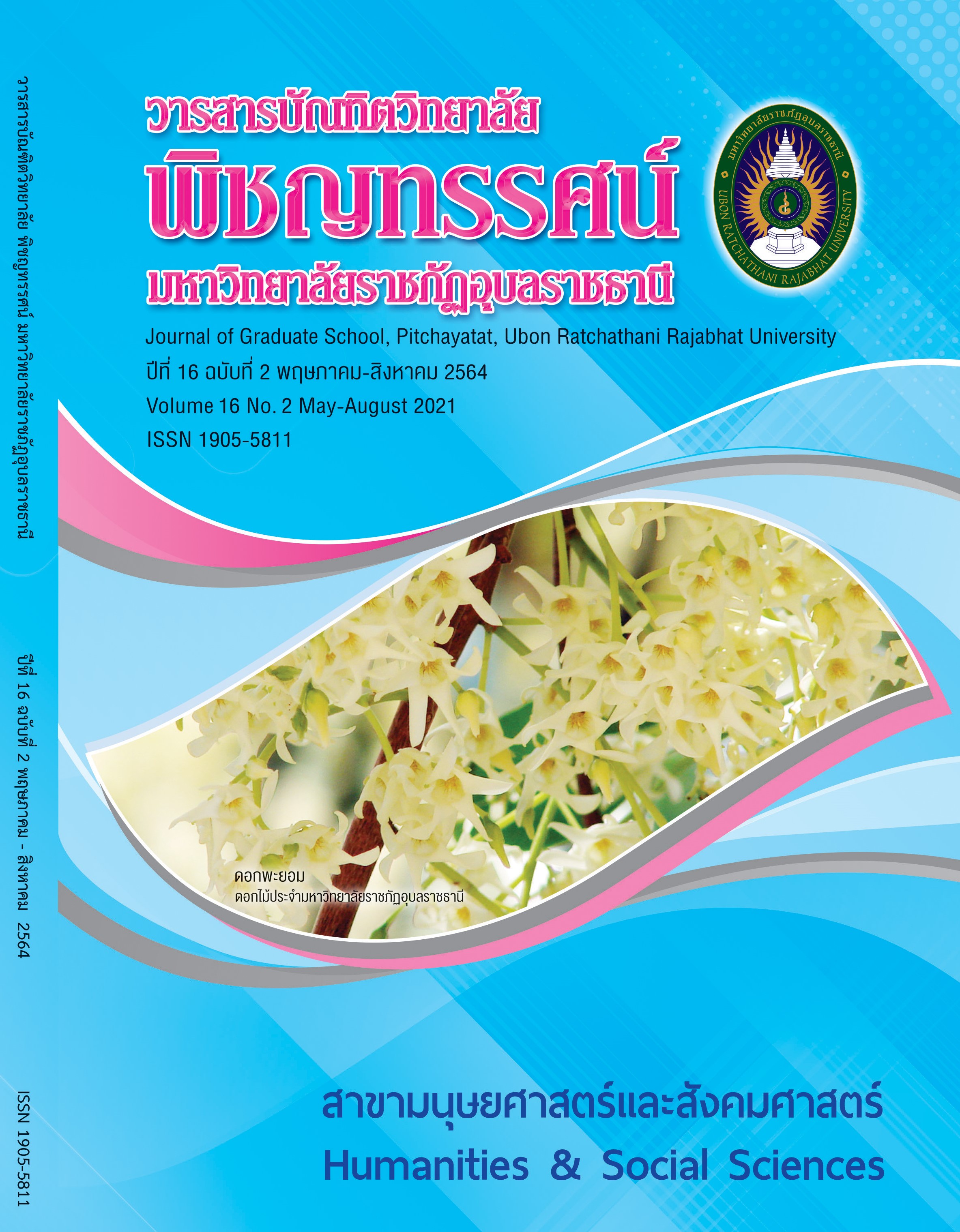อิทธิพลของการรับรู้คุณภาพการบริการทางการศึกษาต่อความยึดมั่นผูกพันในวิชาการของกลุ่มผู้ใช้บริการเจนเนอเรชั่นแซดในสถาบันการศึกษาที่จัดการเรียนการสอนด้านบริหารธุรกิจในจังหวัดอุบลราชธานี
คำสำคัญ:
การรับรู้, คุณภาพบริการทางการศึกษา, ความยึดมั่นผูกพันในวิชาการบทคัดย่อ
งานวิจัยนี้มีวัตถุประสงค์เพื่อศึกษาการรับรู้ และอิทธิพลของการรับรู้คุณภาพการบริการทางการศึกษาต่อความยึดมั่นผูกพันในวิชาการของกลุ่มผู้ใช้บริการเจนเนอเรชั่นแซดในสถาบันการศึกษาที่จัดการเรียนการสอนด้านบริหารธุรกิจและการจัดการในจังหวัดอุบลราชธานี โดยเก็บข้อมูลจากตัวอย่างนักศึกษาระดับปริญญาตรี จำนวน 368 คน สถิติที่ใช้ในการวิเคราะห์ข้อมูล ได้แก่ ค่าเฉลี่ย ค่าเบี่ยงเบนมาตรฐาน และการวิเคราะห์การถดถอยพหุคูณ
ผลการวิจัยพบว่า
ผลการศึกษา การรับรู้ ในคุณภาพการบริการทางการศึกษา 5 มิติ ตามเครื่องมือวัดคุณภาพการบริการ SERVQUAL ได้แก่ สิ่งที่จับต้องได้ ความน่าเชื่อถือ การตอบสนองของพนักงาน ความไว้วางใจ และ ความเอาใจใส่ พบว่า การรับรู้บริการที่ดี ทุกมิติ อย่างไรก็ตามการรับรู้คุณภาพการบริการทางการศึกษามีอิทธิพลต่อความยึดมั่นผูกพันในวิชาการในด้านปัญญา (R2 =18.5%) และด้านพฤติกรรม (R2 =13.3%)เพียงเล็กน้อย แต่มีอิทธิพลสูงต่อความยึดมั่นผูกพันในวิชาการด้านอารมณ์ (R2 =29.6%) โดยมี 2 ปัจจัย ที่แสดงค่า p-value < 0.05 ได้แก่ การรับรู้ในมิติความเอาใจใส่ และมิติสิ่งที่จับต้องได้
เอกสารอ้างอิง
ธัญนันท์ วีรภัทรรุ่งโรจน. ลักษณะความแตกต่างระหว่าง Generation X, Y และ Z ในกรุงเทพมหานครและพฤติกรรมในการสั่งซื้อสินค้าออนไลน์. วิทยานิพนธ์บริหารธุรกิจมหาบัณฑิต มหาวิทยาลัยเนชั่น, 2559
ธานินท์ ศิลป์จารุ. การวิจัยและวิเคราะห์ข้อมูลทางสถิติด้วย SPSS. พิมพ์ครั้งที่ 11. กรุงเทพฯ: วี อินเตอร์ พริ๊นต์, 2553.
บุญใจ ศรีสถิตนรากูร. การพัฒนาและตรวจสอบคุณภาพเครื่องมือวิจัย: คุณสมบัติการวัดเชิงจิตวิทยา. กรุงเทพฯ: โรงพิมพ์แห่งจุฬาลงกรณ์มหาวิทยาลัย, 2555.
สุภัสรา วิภากูล. “คุณภาพการให้บริการที่เป็นเลิศกับความประทับใจของผู้ใช้บริการในสถาบันอุดมศึกษา,” ศึกษาศาสตร์ มหาวิทยาลัยศิลปากร. 16, 2 (กรกฎาคม 2561): 20-33.
สุทธิพร สัจพนโรจน์. ความท้าทายของอุดมศึกษาไทยในปัจจุบัน.สถาบันนวัตกรรมการเรียนรู้ มหาวิทยาลัยมหิดล (ออนไลน์) 2562 (อ้างเมื่อ 16 ธันวาคม 2563). จาก http://il.mahidol.ac.th/ th/ i-Learning-Clinic/lecture-and-learning-management
Admission premium. เปรียบเทียบสถิติ TCAS61,TCAS62,TCAS63 (ออนไลน์) 2564 (อ้างเมื่อ 14 มิถุนายน 2564). จาก https://www.admissionpremium.com/content/6173
Al-Otaibi, S. A., S. M. Yusof and W. K. Wan Ismail. “A Review of Service Quality at Higher Learning Institutions,” European Journal of Business and Management. 8, 30 (2016): 46-53.
Arambewela, R. and J.Hall. “A comparative analysis of international education satisfaction using SERVQUAL,” Journal of Services Research. 6, 3 (July 2006): 141–163.
Brown, C. W. Service quality as a predictor for academic’s engagement academics performance and student satisfaction. Unpublished doctoral dissertation East Carolina University, 2014.
Cronbach, L. J. Essentials of psychological testing. 5th ed. New York: Harper Collins Publishers, 1990
Groves, M. et al. “Factors affecting student engagement: A case study examining two cohorts of student attending a post-1992 university in United Kingdom,” International journal of higher education. 4, 2 (January 2015): 27-37.
Mohr, K A. J and E.S. Mohr. “Understanding Generation Z Students to Promote a Contemporary Learning Environment on Empowering Teaching Excellence,” Journal on empowering teaching excellence. 1, 9 (March 2017): 84-94.
Nelwan, M. L. “Analysis of Student Perception on the Quality of Service Provided by a Private Higher Education Institution in East Indonesia,” International Journal of Academic Research in Business and Social Sciences. 10, 4 (April 2020): 12-25.
Parasuraman, A., V. A. Zeithaml and L. L. Berry. “SERVQUAL: A multiple item scale for measuring consumer perceptions of service quality,” Journal of retailing, 64, 1 (January 1988): 12-40.
ดาวน์โหลด
เผยแพร่แล้ว
รูปแบบการอ้างอิง
ฉบับ
ประเภทบทความ
สัญญาอนุญาต
บทความทุกเรื่องได้รับการตรวจความถูกต้องทางวิชาการโดยผู้ทรงคุณวุฒิภายนอกอย่างน้อย 3 คน ความคิดเห็นในวารสารพิชญทรรศน์เป็นความคิดเห็นของผู้นิพนธ์มิใช่ความคิดเห็นของผู้จัดทำ จึงมิใช่ความรับผิดชอบของวารสารพิชญทรรศน์ และบทความในวารสารพิชญทรรศน์สงวนสิทธิ์ตามกฎหมายไทย การจะนำไปเผยแพร่ต้องได้รับอนุญาตเป็นลายลักษณ์อักษรจากกองบรรณาธิการ





